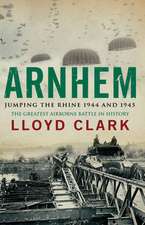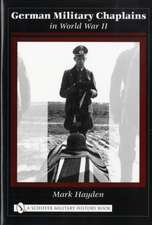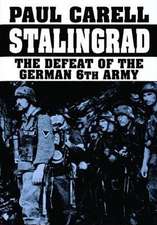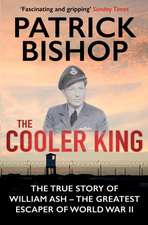Blitzkrieg: Myth, Reality, and Hitler's Lightning War: France 1940
Autor Lloyd Clarken Limba Engleză Hardback – 20 sep 2016
In the spring of 1940, the Germans launched a military offensive in France and the Low Countries that married superb intelligence, the latest military thinking, and new technology to achieve in just six weeks what their fathers had failed to achieve in all four years of the First World War. It was a stunning victory, altering the balance of power in Europe in one stroke, and convinced the entire world that the Nazi war machine was unstoppable.
But as Lloyd Clark, a leading British military historian and academic, argues in Blitzkrieg, much of our understanding of this victory, and blitzkrieg itself, is based on myth. Far from being a foregone conclusion, Hitler’s plan could easily have failed had the Allies been even slightly less inept or the Germans less fortunate. The Germans recognized that success depended not only on surprise, but on avoiding being drawn into a protracted struggle for which they were not prepared. And while speed was essential, 90% of Germany’s ground forces were still reliant on horses, bicycles, and their own feet for transportation. There was a real fear of defeat. Their surprise victory proved the apex of their achievement; far from being undefeatable, Clark argues, the France 1940 campaign revealed Germany and its armed forces to be highly vulnerable—a fact dismissed by Hitler as he began to plan for his invasion of the Soviet Union.
But as Lloyd Clark, a leading British military historian and academic, argues in Blitzkrieg, much of our understanding of this victory, and blitzkrieg itself, is based on myth. Far from being a foregone conclusion, Hitler’s plan could easily have failed had the Allies been even slightly less inept or the Germans less fortunate. The Germans recognized that success depended not only on surprise, but on avoiding being drawn into a protracted struggle for which they were not prepared. And while speed was essential, 90% of Germany’s ground forces were still reliant on horses, bicycles, and their own feet for transportation. There was a real fear of defeat. Their surprise victory proved the apex of their achievement; far from being undefeatable, Clark argues, the France 1940 campaign revealed Germany and its armed forces to be highly vulnerable—a fact dismissed by Hitler as he began to plan for his invasion of the Soviet Union.
Preț: 113.54 lei
Nou
Puncte Express: 170
Preț estimativ în valută:
21.73€ • 23.23$ • 18.11£
21.73€ • 23.23$ • 18.11£
Carte indisponibilă temporar
Doresc să fiu notificat când acest titlu va fi disponibil:
Se trimite...
Preluare comenzi: 021 569.72.76
Specificații
ISBN-13: 9780802125132
ISBN-10: 0802125131
Pagini: 480
Dimensiuni: 152 x 229 mm
Greutate: 0.79 kg
Editura: Grove/Atlantic, Inc.
Colecția Atlantic Monthly Press
ISBN-10: 0802125131
Pagini: 480
Dimensiuni: 152 x 229 mm
Greutate: 0.79 kg
Editura: Grove/Atlantic, Inc.
Colecția Atlantic Monthly Press
Recenzii
Advance Praise for Blitzkrieg:
“A masterly account teeming with vivid personalities and the usual mixture of heroism, incompetence, and luck . . . Clark provides plenty of juicy details and a mildly controversial reinterpretation.”—Kirkus Reviews
“This genuinely revisionist account of the Battle of France in 1940 proves a deeply shocking fact—we are essentially still in thrall to the view of Blitzkrieg tactics that Adolf Hitler and Joseph Goebbels wanted us to have, even over three-quarters of a century later. Lloyd Clark’s brilliant analysis proves that Fall Gelb wasn’t all about unstoppable, superior panzers and Stukas, but was in fact an audacious, highly risky infantry-based plan that could have gone badly wrong given a different Allied mindset.”—Andrew Roberts, New York Times bestselling author of The Storm of War: A New History of the Second World War and Napoleon: A Life
“Lloyd Clark has written a lucid, intelligent and thought provoking re-appraisal . . . His ground breaking detailed research will make it the seminal work on the fall of France in 1940. The story of the break-through unfolds at a fascinating and cracking pace . . . Blitzkrieg is a remarkable book.”—Robert Kershaw, author of 24 Hours at the Somme, 24 Hours at Waterloo, and It Never Snows in September
“A breakthrough book, bringing the drama of Hitler’s May 1940 offensive in France vividly to life—alongside a major re-appraisal of the campaign’s significance. Excellent.”—Michael Jones, author of After Hitler and Total War
Praise for The Battle of the Tanks:
“A comprehensive analysis of WWII’s greatest land battle and one of history’s greatest armor engagements. [Clark] blends archival research, participant interviews, and professional insight in presenting the genesis, conduct, and consequences of the Battle of Kursk . . . With this account, Clark confirms his reputation as one of Britain’s outstanding scholars of operational military history.”—Publishers Weekly
“A leading British military historian reconsiders the events of World War II—this time, on the decisive yet less-trammeled Eastern Front. In this deeply informed overview, Clark offers an authoritative appraisal of the “total war” engulfing both Germany and the Soviet Union . . . Vigorous depictions of German and Soviet military leaders alternate with the words of ordinary soldiers and richly described specifications of military hardware.”—Kirkus Reviews
“An experienced and literate military historian gives us a stellar account of the Battle of Kursk in 1943, one of the more obscure of WWII’s decisive battles . . . The German Panzer forces on the Eastern Front never recovered their offensive capabilities, and the author has shown why in vivid, sometimes harrowing, detail, making extensive use of Russian sources only recently made available. A major addition to the literature of the Eastern Front, the decisive land theater of WWII.”—Booklist
“The Battle of Kursk was the last great German offensive on the Second World War’s eastern front . . . This was an epic encounter . . . This extraordinary clash is done full justice in Lloyd Clark’s fine book on the battle. Clark, a lecturer at Sandhurst, takes a long view, putting Kursk properly in the context of the origins of the war in the east and the first two years of that bloody and terrible conflict . . . An excellent account—lucid and poignant.”—BBC History Magazine
“A masterly account teeming with vivid personalities and the usual mixture of heroism, incompetence, and luck . . . Clark provides plenty of juicy details and a mildly controversial reinterpretation.”—Kirkus Reviews
“This genuinely revisionist account of the Battle of France in 1940 proves a deeply shocking fact—we are essentially still in thrall to the view of Blitzkrieg tactics that Adolf Hitler and Joseph Goebbels wanted us to have, even over three-quarters of a century later. Lloyd Clark’s brilliant analysis proves that Fall Gelb wasn’t all about unstoppable, superior panzers and Stukas, but was in fact an audacious, highly risky infantry-based plan that could have gone badly wrong given a different Allied mindset.”—Andrew Roberts, New York Times bestselling author of The Storm of War: A New History of the Second World War and Napoleon: A Life
“Lloyd Clark has written a lucid, intelligent and thought provoking re-appraisal . . . His ground breaking detailed research will make it the seminal work on the fall of France in 1940. The story of the break-through unfolds at a fascinating and cracking pace . . . Blitzkrieg is a remarkable book.”—Robert Kershaw, author of 24 Hours at the Somme, 24 Hours at Waterloo, and It Never Snows in September
“A breakthrough book, bringing the drama of Hitler’s May 1940 offensive in France vividly to life—alongside a major re-appraisal of the campaign’s significance. Excellent.”—Michael Jones, author of After Hitler and Total War
Praise for The Battle of the Tanks:
“A comprehensive analysis of WWII’s greatest land battle and one of history’s greatest armor engagements. [Clark] blends archival research, participant interviews, and professional insight in presenting the genesis, conduct, and consequences of the Battle of Kursk . . . With this account, Clark confirms his reputation as one of Britain’s outstanding scholars of operational military history.”—Publishers Weekly
“A leading British military historian reconsiders the events of World War II—this time, on the decisive yet less-trammeled Eastern Front. In this deeply informed overview, Clark offers an authoritative appraisal of the “total war” engulfing both Germany and the Soviet Union . . . Vigorous depictions of German and Soviet military leaders alternate with the words of ordinary soldiers and richly described specifications of military hardware.”—Kirkus Reviews
“An experienced and literate military historian gives us a stellar account of the Battle of Kursk in 1943, one of the more obscure of WWII’s decisive battles . . . The German Panzer forces on the Eastern Front never recovered their offensive capabilities, and the author has shown why in vivid, sometimes harrowing, detail, making extensive use of Russian sources only recently made available. A major addition to the literature of the Eastern Front, the decisive land theater of WWII.”—Booklist
“The Battle of Kursk was the last great German offensive on the Second World War’s eastern front . . . This was an epic encounter . . . This extraordinary clash is done full justice in Lloyd Clark’s fine book on the battle. Clark, a lecturer at Sandhurst, takes a long view, putting Kursk properly in the context of the origins of the war in the east and the first two years of that bloody and terrible conflict . . . An excellent account—lucid and poignant.”—BBC History Magazine
Notă biografică
Lloyd Clark is one of the UK’s leading military historians. He is is Professor of Modern War Studies and Contemporary Military History at University of Buckingham, a Fellow of the Royal Historical Society, a member of the British Commission for Military History, and historian to the Airborne Assault Normandy Trust. The author of several books, and he has lectured on military history all over the world and is a frequent guide to battlefields on four continents.
Descriere
Descriere de la o altă ediție sau format:
From celebrated military historian Lloyd Clark comes a riveting and richly detailed reassessment of one of the greatest military victories of the Second World War.
From celebrated military historian Lloyd Clark comes a riveting and richly detailed reassessment of one of the greatest military victories of the Second World War.












